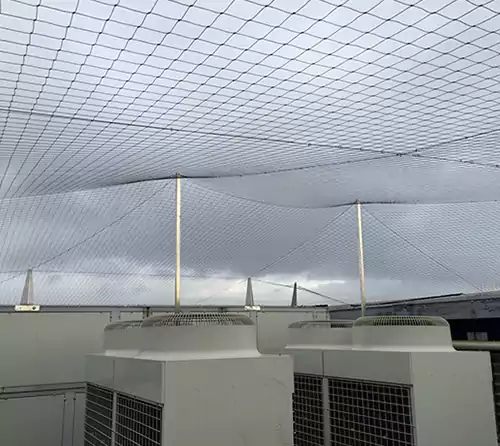Anti Seagull Nets
Anti Seagull Nets
Anti-Seagull Nets Are Specialized Installations Designed To Prevent Seagulls And Other Seabirds From Accessing Specific Areas Such As Rooftops, Docks, Piers, And Outdoor Facilities. These Nets Serve As Protective Barriers, Effectively Deterring Seagulls And Ensuring The Cleanliness, Safety, And Aesthetic Appeal Of Residential And Commercial Properties Located In Coastal Areas Or Near Bodies Of Water.
- We’re professional Installation
- Affordable Pricing
- We use quality material
- 100% customers satisfaction
The primary purpose of anti-seagull nets is bird control. Seagulls are common coastal pests known to cause damage to buildings, create unsanitary conditions with their droppings, and pose health risks to occupants. Without proper bird control measures, properties may suffer from structural damage, hygiene issues, and nuisance caused by bird infestations. Anti-seagull nets act as physical barriers, blocking access to areas where seagulls may roost, nest, or perch.
Anti-Seagull Nets Are Typically Made From Durable Materials Such As High-Density Polyethylene (HDPE) Or Nylon, Capable Of Withstanding Environmental Factors Such As UV Radiation, Saltwater Exposure, And Strong Winds. They Are Designed To Be Installed Securely Around The Perimeter Of Rooftops, Docks, Or Other Areas Prone To Seagull Activity, Creating A Protective Enclosure That Deters Seagulls From Entering.
Anti-seagull nets offer numerous benefits for property owners and occupants:
1. Bird Control: Anti-seagull nets effectively control seagull populations and prevent damage and nuisance caused by seagulls.
2. Hygiene: Anti-seagull nets help maintain cleanliness and hygiene by preventing bird droppings from contaminating outdoor spaces.
3. Safety: Anti-seagull nets reduce the risk of accidents or injuries caused by bird-related hazards such as slippery surfaces or falling debris.
4. Aesthetic Appeal: Anti-seagull nets are discreet and blend seamlessly with the architecture of buildings, preserving the visual appeal of properties while providing effective bird control.
Overall, anti-seagull nets are essential safety investments for properties located in coastal areas or near bodies of water affected by seagull infestations, helping to protect buildings, occupants, and outdoor spaces from the negative impacts of bird activity.

